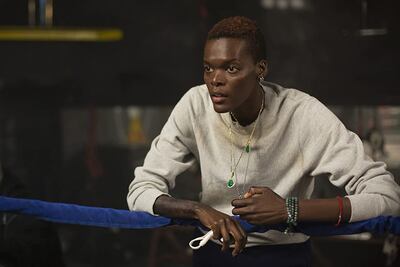Halle Berry’s impressive performances have been few and far between since she won the 2002 Best Actress Academy Award for Monster’s Ball. So it shouldn’t come as a surprise that Bruised features her best acting work in 20 years.
Berry is utterly transfixing as Jackie Justice, a mixed martial arts fighter who has wasted the best years of her career and fallen on hard times. After the unexpected return of Manny (Danny Boyd Jr), her son, aged 6, who she previously left with his father, Justice decides to get back into the ring, accepting an offer to fight the best female MMA fighter in the world in an unsanctioned bout.
What makes Berry’s turn in front of the camera all the more impressive is that she also makes her directing debut behind it, too. The dual position clearly suits her. Berry leads from the front, as she immediately brings an intensity to the sports drama that pulsates all the way through its 138-minute-long running time.
Over the course of its gritty and distressing opening 20 minutes, Berry establishes that Bruised isn’t going to pull any punches. Not only is Justice sexually assaulted, but she gets into a screaming match with her lover and manager Desi (Adan Canto), who takes her to an underground MMA clash, where she exchanges gory punches and then violent headbutts with one of the fighters.

Berry’s portrayal is so transformative and fiery that you truly believe her as the pugilist. There’s an internal anger that burns throughout her performance. So much so that her best work arrives in the silent moments before she unleashes on her opponents, as Berry is able to convey the unsaid fury that motivates and empowers her.
Berry’s directing is equally as impressive. Firstly, she elevates every other actor that shares the screen with her. Then, alongside cinematographer Frank G DeMarco, she brings an attention to detail that makes Justice’s dank and depressing living and working conditions come to life in an authentic but subtle manner.

It’s just a shame that all of Berry’s fine work is undercut by Bruised’s needlessly long running time. The warning signs that it is going to be too long for its own good arrive very early on, as Berry establishes way too much, too soon. For the next hour, though, the film actually progresses in an engaging and heartfelt manner, akin to Darren Aronofsky’s The Wrestler.
The emotional explorations of Jackie’s relationships with Manny, her new trainer Buddhakan (Sheila Atim), and her mother (Adriane Lenox) make you all the more invested in her journey. Sure, Bruised occasionally lapses into cliche and overly-familiar territory, but Berry is so poignant and affecting as Jackie looks to overcome her past trauma and alcoholism, that it doesn’t really matter.
Ultimately, though, Bruised succumbs to mediocrity because Michelle Rosenfarb’s script tries to pack way too much in. There’s at least a 20-minute period before the finale where it really slumps in momentum, while one late plot is so needless that it nearly derails the entire film.
What makes these issues all the more frustrating is that Bruised’s final act is actually very captivating and dramatic. Berry proves she’s equally as adept directing action sequences as she is with drama, as the fight builds in a truly gripping fashion. Come the end, you can’t help but be stirred by what unfolds. Even its final shot manages to be moving.
Despite its issues, Bruised is undoubtedly a triumphant first directorial outing from Berry. It’s also a reminder that, when she has the material, she’s one of the best actresses in the world.
Bruised is available on Netflix from November 24

